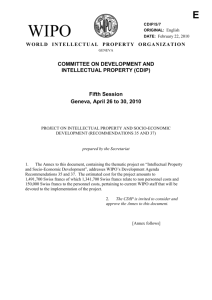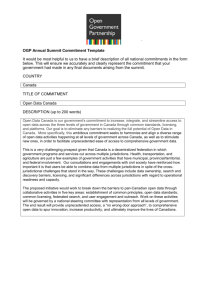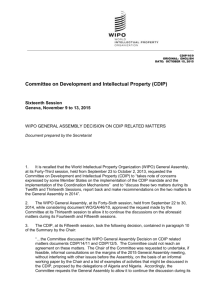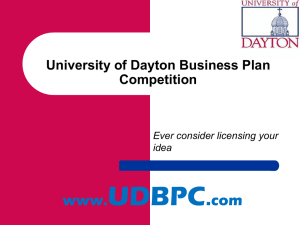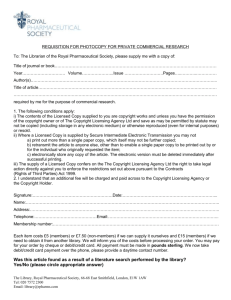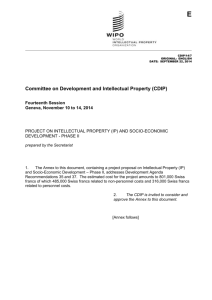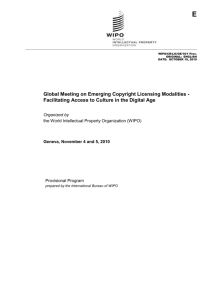Project on Intellectual Property and Competition Policy
advertisement
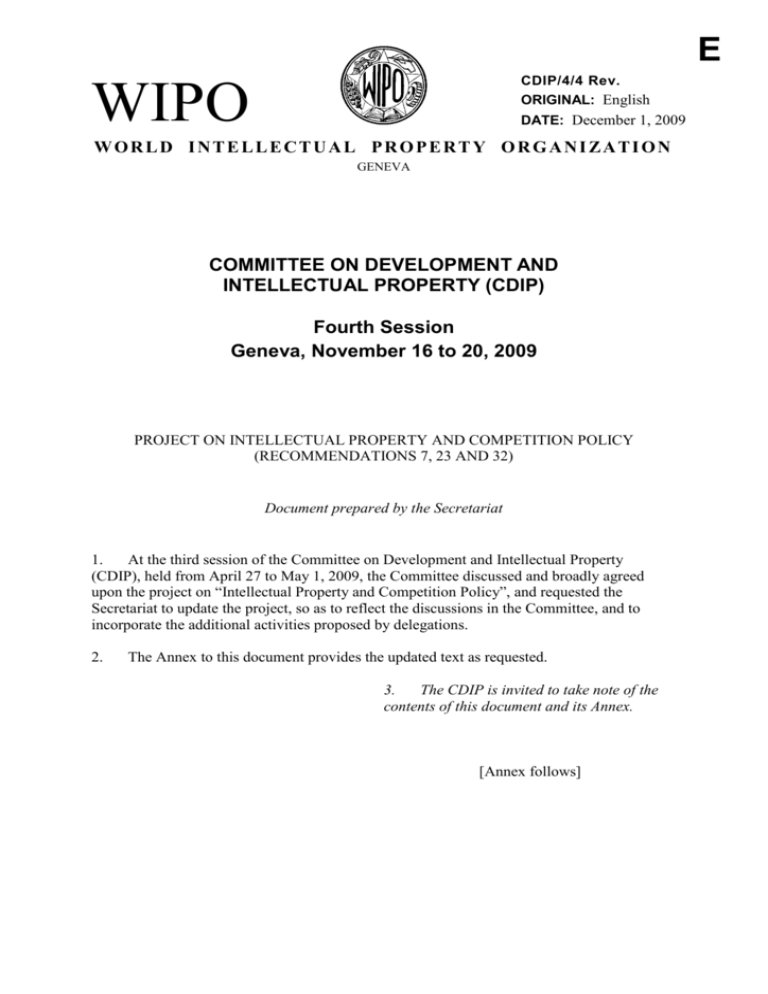
E CDIP/4/4 Rev. WIPO ORIGINAL: English DATE: December 1, 2009 WORLD INTELLECTUAL PROPERTY ORGANIZATION GENEVA COMMITTEE ON DEVELOPMENT AND INTELLECTUAL PROPERTY (CDIP) Fourth Session Geneva, November 16 to 20, 2009 PROJECT ON INTELLECTUAL PROPERTY AND COMPETITION POLICY (RECOMMENDATIONS 7, 23 AND 32) Document prepared by the Secretariat 1. At the third session of the Committee on Development and Intellectual Property (CDIP), held from April 27 to May 1, 2009, the Committee discussed and broadly agreed upon the project on “Intellectual Property and Competition Policy”, and requested the Secretariat to update the project, so as to reflect the discussions in the Committee, and to incorporate the additional activities proposed by delegations. 2. The Annex to this document provides the updated text as requested. 3. The CDIP is invited to take note of the contents of this document and its Annex. [Annex follows] CDIP/4/4 Rev. ANNEX PROJECT DOCUMENT 1. SUMMARY Project Code: DA_7_23_32_01 Title: Intellectual Property and Competition Policy Development Agenda Recommendation(s): Recommendation 7 (Cluster A): Promote measures that will help countries deal with intellectual property related anti-competitive practices, by providing technical cooperation to developing countries, especially LDCs, at their request, in order to better understand the interface between IPRs and competition policies. Recommendation 23 (Cluster B): To consider how to better promote pro-competitive intellectual property licensing practices, particularly with a view to fostering creativity, innovation and the transfer and dissemination of technology to interested countries, in particular developing countries and LDCs. Recommendation 32 (Cluster C): To have within WIPO, an opportunity for exchange of national and regional experiences and information on the links between IPRs and competition policies. Project Budget: Non-personnel costs: Sfr.430,000 Personnel costs: Sfr.640,000 Project Duration: 24 months Key WIPO Sectors Involved and Links to WIPO Programs: Patent Division; Copyright and Related Rights Sector; Sector of Trademarks; Industrial Designs and Geographical Indications; Technical Assistance and Capacity Building Sector; and Development Agenda Coordination Division. Links to WIPO Programs 1, 2, 3, 8 and 9. Brief Description of Project: In order to promote a better understanding of the interface between intellectual property and competition policy, particularly in developing countries and countries with economies in transition, WIPO would undertake a series of activities that would collect and scrutinize recent practices, legal developments, jurisprudence and legal remedies available in selected countries and regions, comprising both practices of collusion or conspiracy between competitors (bilateral practices, including licensing agreements), and practices of unilateral misuse with anticompetitive effects (vertical price maintenance, tie-ins, refusal to deal, in certain circumstances). Those activities will consist of surveys as well as a series of sub-regional seminars and Geneva-based symposia which will be organized as fora for exchange of experiences in this field. WIPO’s licensing training programs will include a component on the pro-competitive aspects of licensing and anti-competitive licensing practices, and a Global Meeting will be organized on Emerging Copyright Licensing Modalities. The studies and the proceedings of a CDIP/4/4 Annex, page 2 number of meetings will be published. The WIPO’s Guide on Franchising will also be revised and updated so as to reflect the eventual interaction between such a business model and antitrust law. CDIP/4/4 Annex, page 3 2. 2.1. PROJECT DESCRIPTION Introduction to the Issue/Concern The interface between the intellectual property system and competition policy has attracted increasing attention in recent years, as intellectual property rights have gained increasing importance in the knowledge economy, and a number of countries have established or enhanced the role of national authorities entrusted with competition policy. While the literature on the interface between intellectual property and competition policy, generally, and more specifically in relation to licensing, is well-developed, analysis has focused on the experience of a few developed countries, and there is scope for analyzing how the issue is being addressed in other jurisdictions, particularly in developing countries and countries with economies in transition, for the benefit of Member States who might be able to draw lessons from the experiences of other countries. One key area of interaction between IP and Competition policy is in relation to licensing agreements between private parties. Licensing is a mechanism used by IP right-holders to authorize others to use their IP under agreed terms and conditions. Licensing agreements may be concluded for a variety of purposes and may be useful instruments for the transfer of technology between parties, and more generally, for the dissemination of technology, creative works and other subject matter protected by IPRs. However, under certain circumstances, licensing agreements may have an anti-competitive effect in the marketplace, and many countries have developed mechanisms to deal with such instances. In recent years, Member States and stakeholders have shown an increasing interest in licensing practices that are emerging in the new technological environment, for example, how certain territorially-limited licensing practices in the field of collective management of copyright, may have anti-competitive effects. The emergence of new licensing practices appear to reflect the development of new models of collaborative innovation and creativity. In the field of copyright, for example, this has resulted in a new, more dynamic position of the user in the network environment, which is no longer considered as a mere passive recipient of creativity, but as a creative agent itself. WIPO’s previous work in this area: The interface between IP and competition law has increasingly attracted the interest of Member States, and has recently been included as a topic in a number of WIPO meetings and seminars. For example, a number of recent WIPO meetings organized in Latin America, have dedicated full sessions to IP and Competition Policy. In October 2008, the WIPO Asia-Pacific Regional Seminar on Intellectual Property Rights and Competition Policy, held in Daejeon (Republic of Korea) was entirely devoted to the issue. In the context of WIPO’s legislative assistance, WIPO has, where so requested, addressed the inclusion of competition-related provisions in industrial property laws. Such inclusion has been primarily on two different levels: (1) the definition of the scope of rights and obligations under intellectual property, including appropriate limitations and exceptions; and (2) the establishment of systems to address anti-competitive practices by means of the use of intellectual property mechanisms (e.g. compulsory licenses). Information on WIPO’s technical and legal assistance on this issue is available in document CDIP/2/INF/5. Licensing has been an important area of work for WIPO for many years. In recent years, WIPO has developed a series of tools, training kits and flexible interactive training programs in the area of licensing, tailored to the needs of Member States, particularly developing countries and countries with economies in transition. In particular, the “Successful Technology Licensing” training program has been conducted in a large number of Member States, with a view to enhancing the capacity of institutions to negotiate licensing agreements. Over the past few years, WIPO has also issued a number of publications on licensing including, in particular, a Guide on the Licensing of Copyright and Related Rights (Publication No. 897), CDIP/4/4 Annex, page 4 Successful Technology Licensing (Publication No. 903) and Exchanging Value – Negotiating Technology Licensing Agreement: A Training Manual (Publication No. 906). To the extent that anti-competitive practices may operate in a unilateral manner (as opposed to licensing and assignment agreements) by means of the leveraging of IP owners’ market power, where it exists, more research work is required in this area. 2.2. Objectives The objective of this project is established by Recommendations 7, 23 and 32, of the WIPO Development Agenda. Taking into account the proposed activities in Document CDIP/1/3, the project will aim at enabling policy-makers, particularly in developing countries and LDCs, to better understand the interface between IPRs and competition policies; promote pro-competitive intellectual property licensing practices; and provide an opportunity for the exchange of national and regional experiences and information on the links between IPRs and competition policies. 2.3. Delivery Strategy The project will include eight components: (i) Introducing the Issue in WIPO Training Programs on Technology Licensing: Introduction of a specific, but descriptive and factual, part on licensing, anti-competitive licensing practices and other competition aspects into the WIPO training programs on technology licensing, with a view to making available more focused information on the pro-competitive aspects of licensing as a tool for fostering innovation and technology transfer, and on licensing practices that can be considered as anti-competitive. As a first step, the issue would be incorporated as a regular item into WIPO’s technology licensing programs. In addition, the toolkit and publication used for the training programs will be updated in order to include this issue. (ii) Studies on IP and Competition in Selected Countries and Regions: A series of studies on recent developments concerning the interface between intellectual property rights and competition policy will be undertaken. The focus will be primarily on the collection and analysis of Member States’ experiences, such as legal developments, jurisprudence and legal remedies in this respect in different countries and regions. As a by-product of this exercise, the Secretariat will provide for the inclusion in its database of laws a section with legislation concerning IP in the context of anti-competitive practices. The studies will also analyze the interaction of agencies dealing with the two legal areas – IP and competition law – in different countries. A list of topics and experts will be submitted to Member States. The studies, once elaborated, will be sent to other relevant IGO’s for their peer-review. The respective comments will be part of the final output. (iii) Meetings on IP and Competition at the Regional Level: Following the first regional meeting on IP and Competition, held in Daejeon, Republic of Korea, in October 2008, similar meetings would be held in other regions or sub-regions, upon the request of Member States. The purpose of those meetings would be to explore the interface between IP rights and competition policy and to understand the different approaches towards the issue in an objective and factual manner. (iv) Global Meeting on Emerging Copyright Licensing Modalities: This two-day meeting would gather in Geneva, an array of stakeholders who are implicated in copyright licensing practices. Taking into account the rapid developments in regard to online uses, and the ways in which older and newer forms of licensing are increasingly interacting with each other (e.g. the rise of open-access scientific publishing, the development of mixed software platforms, where proprietary and open source software are combined in the same technology or application), it is proposed to convene a Global Meeting on CDIP/4/4 Annex, page 5 Emerging Copyright Licensing Modalities, in order to examine new challenges in this area, including from a competition standpoint. Multiple issues flow from the different licensing practices, which would be useful to examine, such as the compatibility between traditional copyright licenses and newer forms of licensing, including the competitive impact of territorially-limited versus multi-jurisdictional licenses, in order to identify potential problems. Therefore, there is work to be done in terms of collecting /gathering the facts concerning different copyright licensing practices, describing and analyzing them in a manner useful to Member States. The Global Meeting would be a useful first step in this respect. (v) Organization of Geneva-based Symposia on Emerging Challenges over the Anti-Competitive Use of IP: A half-day symposia would be organized at WIPO headquarters, to discuss in depth certain practices that are emerging from new business models and new economic circumstances. Other issues would also be scrutinized, such as: restraining courts’ authority to automatically issue injunctions in the event of IP infringement; the technical bundling of computer programs as a way of fencing-off competition; and the recurring issue of exhaustion, in its diverse modalities. This type of meeting is cost-effective to the extent that experts from the private sector could be self-financed. The symposia would target Geneva-based diplomats, industry representatives, and a number of relevant NGO’s. As participation in these Symposia would be necessarily limited, the Secretariat could open a forum on the Internet, preceding each symposium, with the purpose of collecting broader views and positions about each specific topic. Those views and positions would be summarized and presented to the participants of each Symposia. (vi) Elaboration of a Survey and Development of a Guide on Franchising: Franchising is seen as a very effective model for triggering new business opportunities in developing countries, and it is actually a thriving business in a number of countries. A Guide on Franchising would look not only at the general IP aspects of that sort of contractual relationship, but would also examine potential antitrust implications. Its development would be preceded by a survey of practices in Member States. The purpose of the survey would be to identify general trends and common solutions, particularly as far as the interface between franchising agreements and competition policy is concerned. The Guide would reflect prevailing practices in that particular field, and comment on them. This Guide would build on previous WIPO works on franchising, and the Guide to be issued would be rather an expansion and updating of WIPO publication No. 480(E), with a special focus on antitrust-related provisions and clauses. However, it should be emphasized that the survey under this component will be a stand-alone product, in the sense that it will be carried out and finalized as a separate activity. The survey, therefore, will be a companion to the Guide, rather than an integral part of it. (vii) Elaboration of a Survey and Analysis on the use of Compulsory Licenses to repress Anticompetitive Practices. A questionnaire will be prepared and circulated among Member States with the aim of collecting information on the use of compulsory licenses to repress anticompetitive practices, under the framework of Article 5(A)(2) of the Paris Convention and Article 31(k) of the TRIPS Agreement. Responses will be compiled and analyzed. (viii) Publication of studies and proceedings of relevant meetings: Publications will be preceded by a review of contents in order to assess convenience, opportunity and quality. It is foreseeable that not all meetings will produce material for publication, and therefore it is impossible to predict, at this stage, how many (and when) publications may be issued. As WIPO’s Symposia will be focused on specific topics, reviewing and editing contents of the corresponding publications will be nevertheless a relatively simple task. As per the recommendations that are being addressed through this project, the focus will be primarily on exploring the issues, promoting a better understanding on the interface between IP and competition policy, analyzing various options, facilitating an exchange of experiences and promoting the procompetitive use of IP, particularly in developing countries and LDCs. The activities to be undertaken under this project may be the basis for more in-depth work which may be undertaken subsequently by CDIP/4/4 Annex, page 6 the Organization in this area, if agreed by Member States. Legislative assistance on IP issues, including where they interface with competition issues, would continue to be provided outside of this project, in a confidential manner and on request, as part of the regular activities of WIPO on legislative assistance. CDIP/4/4 Annex, page 7 3. REVIEW AND EVALUATION 3.1. Project Review Schedule A mid-term review will be undertaken after one year, which will be the basis for reporting on progress to the CDIP. 3.2. Project Self-Evaluation In addition to the project self--evaluation, an independent evaluation may also be undertaken for the project Project Outputs Indicators of Successful Completion (Output Indicators) (i) Introducing IP and competition issues into technology licensing programs: Actual inclusion of the issue into training programs; and (ii) Studies on IP and Competition: Completion of the studies within an established timeframe for presentation to the CDIP; and Updating of the guide and toolkit so as to include elements concerning IP and Competition Policy. Broad agreement of Member States with the trust and the conclusions of studies, when presented to the CDIP. (iii) Regional or Sub-Regional Meetings on IP and Competition: Request for such meetings from Member States; and 75% of the participants confirm the usefulness of the meetings with regard to the objectives set. (iv) Global Meeting on Emerging Copyright Licensing Modalities: Organization of a conference in the first quarter of 2010; Broad participation of a wide range of stakeholders at the Global Meeting; and 75% of participants confirm the usefulness of the meeting with regard to the objectives set. (v) Geneva-based Symposia on IP and Competition Policy: Organization of one symposium per semester; Participants of relevant stakeholders and contribution to a better understanding of the topics; and 75% of the participants confirm the usefulness of the meetings with regard to the objectives set. (vi) Elaboration of a survey, development of a Guide on Franchising and organization of two workshops: Obtaining a representative number of replies to the questionnaire; and Timely elaboration and publication of the Guide on Franchising. CDIP/4/4 Annex, page 8 (vii) Elaboration of a survey and analysis on the use of compulsory licenses to repress anticompetitive practices: Timely preparation of the questionnaire, its discussion with Members, its circulation and compilation of answers. (viii) Publication of studies and proceedings of relevant meetings: Publication made on the basis of merit (i.e., fully meeting the specifications of the ToR) and convenience (i.e., assisting to determine priorities and having a broader usefulness beyond those who participated in the meetings). Project Objective(s) Indicator(s) of Success in Achieving Project Objective (Outcome Indicators) Better understanding of the interface between IP and Competition among policy-makers: Feedback by Member States on the extent to which the outputs have met the concerns addressed in the Recommendation(s). Promoting pro-competitive intellectual property licensing practices: Feedback from participants on the training programs concerning the new component; and Adoption of appropriate legal provisions in national or regional laws; adoption of guidelines and recommendations at the national or regional level. Opportunity for exchange of national and regional experiences: Feedback from Member States on the seminars; Feedback from stakeholders on the symposia; Significant number of answers to the questionnaire(s) [at least 25 from developed countries, and 35 from developing countries]; and 75% of participants confirm the usefulness of the meetings with regard to the objectives set. This should be re-checked no later than 6 months later, after the event took place. CDIP/3/4 Annex II, page 9 4. IMPLEMENTATION TIMELINE ACTIVITY QUARTERS 2010 1. Introducing IP and competition issues into technology licensing programs 2. Studies on IP and Competition 3. Regional or Sub-regional Meetings on IP and Competition 4. Global Meeting on Emerging Copyright Licensing Modalities 5. Organization of Geneva-based Symposia 1st 2nd 3rd 4th 1st 2nd 3rd 4th X X X X X X X X X X REVIEW SCHEDULE X X X X X X X 6. Elaboration of a survey, development of a Guide on Franchising and organization of two workshops on this issue 7. Elaboration of a survey and analysis on the use of compulsory licenses to repress anticompetitive practices 8. Publication of studies and certain meetings’ proceedings 2011 X X X X X X X X X X X X X X X CDIP/4/4 Annex II, page 10 5. BUDGET 5.1. Project Budget for the 2010/2011 Biennium (non-personnel costs) TOTAL (Swiss Francs) Travel and Fellowships Staff Missions Third-party Travel Fellowships Contractual Services Conferences Experts’ Honoraria Publishing Others Equipment and Supplies Equipment Supplies and Materials TOTAL 80,000 200,000 75,000 75,000 430,000 CDIP/4/4 Annex, page 11 6. SUPPLEMENTARY INFORMATION FOR THEMATIC PROJECTS The overall Project on IP and Competition Policy (Recommendations 7, 23 and 32) is based on the activities that were proposed at the first session of the CDIP, in document CDIP/1/3, in the context of Recommendation 23. The main difference, if any, between the seven components of the Project and the activities listed in document CDIP/1/3, is that those components appear more focused. A short identification of the links between the proposed activities in CDIP/1/3 (in the context of Recommendation 23), and in the Project Document concerning IP and Competition Policy follows: WIPO will intensify its work on these issues, as and when requested by Member States. For instance, subject to availability of resources, a global meeting on emerging licensing issues and copyright could be organized in Geneva in 2008. […] This activity is covered by Component 4. It is also proposed to continue with awareness-raising activities concerning new approaches to copyright licensing, for example Creative Commons and open-source software, through which subject matter protected by copyright may be freely, or with few restrictions, disseminated for various purposes. […] This activity is covered by Component 4. In addition, it is proposed to commission a series of studies on IP and competition issues (please also see comments for proposal 221) and to organize an international conference, in Geneva, on the interface between IP and competition law and policy. This activity is covered by Components 2, 3, 4 and 5. On request, WIPO can also provide legal and technical advice to promote pro-competitive provisions in IP licensing instruments. This activity is not directly reflected by the project Components because legal and technical advice is a normal, on-going activity of the International Bureau. It will continue to be carried out upon request of Member States on a routine basis. Such advice is also linked to Recommendations dealing with public policy and flexibilities, which are outside the scope of this particular Project, even if inter-related with it. WIPO would also establish a technology transfer database and make available model licensing agreements relating to different technology transfer partners. The database will be available on the ‘STL Fellows Website’, as well as on a hard copy for training purposes. 1 Proposed activities concerning Recommendation 22 are: It is proposed to commission a series of studies on IP and competition issues (please also see comments for proposal 23). This activity is covered by Components 2, 3 and 5 of the Project. CDIP/4/4 Annex, page 12 This activity would be included in the WIPO portal on innovation and technology transfer being developed for implementation of Recommendation 10. It is proposed to also develop a Guide on Franchising and to organize a series of workshops on this issue. This activity is contemplated by Component 6. Component 6 proposes the previous elaboration of a Survey, with the purpose of identifying Members’ prevailing practices and their practical impact. The Guide should reflect successful prevailing practices. On activities relating to licensing and technology transfer, more generally, please see comments for proposal 25. This activity is covered by Component 1. [End of Annex and of document]
